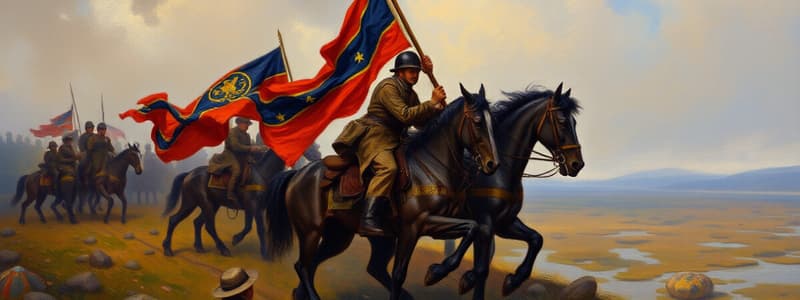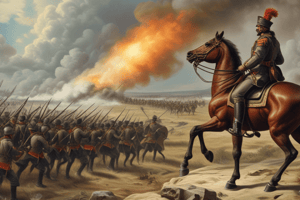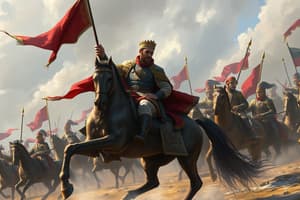Podcast
Questions and Answers
What significant territorial change occurred as a result of the Treaty of Paris in 1856?
What significant territorial change occurred as a result of the Treaty of Paris in 1856?
- Russia gained control over the Black Sea.
- The Ottoman Empire expanded into Russian territory.
- Russia annexed the Christian principalities.
- Russia lost a portion of Bessarabia to Moldavia. (correct)
Which of the following statements best describes the political outcome for Russia after the Crimean War?
Which of the following statements best describes the political outcome for Russia after the Crimean War?
- Russia formed new alliances with Western powers.
- Russia's international standing was diminished. (correct)
- Russia became a leading military power in Europe.
- Russia successfully established a navy in the Black Sea.
How did the Crimean War affect the ideological landscape within Russia?
How did the Crimean War affect the ideological landscape within Russia?
- It led to a major ideological shift towards democracy.
- It ushered in new political ideologies opposing Orthodoxy.
- Autocracy remained unchanged in its central role. (correct)
- It resulted in the overthrow of autocracy.
What was a key limitation imposed on Russia by the Treaty of Paris?
What was a key limitation imposed on Russia by the Treaty of Paris?
Which group represented the two main ideological strands within Russia after the Crimean War?
Which group represented the two main ideological strands within Russia after the Crimean War?
What was one of the key terms concerning Christian subjects in the Ottoman Empire as dictated by the Treaty of Paris?
What was one of the key terms concerning Christian subjects in the Ottoman Empire as dictated by the Treaty of Paris?
Which of the following best describes the long-term political focus of Russia following the Crimean War?
Which of the following best describes the long-term political focus of Russia following the Crimean War?
What major consequence did the Crimean War have on the balance of power in Europe?
What major consequence did the Crimean War have on the balance of power in Europe?
What ideology did Alexander II align with after the Crimean War?
What ideology did Alexander II align with after the Crimean War?
What major reform was implemented following the Crimean War to address governance?
What major reform was implemented following the Crimean War to address governance?
What was one of the main reasons the Slavophiles believed for Russia's defeat in the Crimean War?
What was one of the main reasons the Slavophiles believed for Russia's defeat in the Crimean War?
What significant change to local governance followed the Emancipation of the Serfs?
What significant change to local governance followed the Emancipation of the Serfs?
What did Alexander II believe was essential for maintaining autocratic rule?
What did Alexander II believe was essential for maintaining autocratic rule?
Which of the following best describes the impact of the Crimean War on serfdom?
Which of the following best describes the impact of the Crimean War on serfdom?
What was a primary motivation for serfdom reform among both Westernisers and Slavophiles?
What was a primary motivation for serfdom reform among both Westernisers and Slavophiles?
What major issue regarding the Russian army was revealed by the Crimean War?
What major issue regarding the Russian army was revealed by the Crimean War?
How did the Crimean War affect the status of the nobility in local governance?
How did the Crimean War affect the status of the nobility in local governance?
What was the total number of Russian casualties in the Crimean War?
What was the total number of Russian casualties in the Crimean War?
What major reform did Alexander II implement in response to military failures during the Crimean War?
What major reform did Alexander II implement in response to military failures during the Crimean War?
Which institution was notably reduced but did not completely vanish after the Crimean War?
Which institution was notably reduced but did not completely vanish after the Crimean War?
What aspect of society did Alexandar II consider as the root cause of Russia's problems following the war?
What aspect of society did Alexandar II consider as the root cause of Russia's problems following the war?
Which authority was effectively created by the zemstvo system in local governance?
Which authority was effectively created by the zemstvo system in local governance?
What was the primary purpose of the military reforms enacted under Milyutin from 1862 to 1874?
What was the primary purpose of the military reforms enacted under Milyutin from 1862 to 1874?
Which significant military conflict highlighted the weaknesses of the Russian army despite the reforms?
Which significant military conflict highlighted the weaknesses of the Russian army despite the reforms?
What was the main economic consequence of the Crimean War for Russia?
What was the main economic consequence of the Crimean War for Russia?
What was a significant social change that resulted from the Crimean War?
What was a significant social change that resulted from the Crimean War?
What was one of the limitations of the military reforms despite their initial success?
What was one of the limitations of the military reforms despite their initial success?
How did the reforms impact the agricultural sector in Russia?
How did the reforms impact the agricultural sector in Russia?
In what way did the Tsar's approach to governance change after the Crimean War?
In what way did the Tsar's approach to governance change after the Crimean War?
What was one of the challenges faced in the aftermath of the Emancipation of the Serfs?
What was one of the challenges faced in the aftermath of the Emancipation of the Serfs?
What was a key outcome of the railway expansion after the Crimean War?
What was a key outcome of the railway expansion after the Crimean War?
Which aspect of Russian society saw a decline in influence following the reforms of the 1860s and 1870s?
Which aspect of Russian society saw a decline in influence following the reforms of the 1860s and 1870s?
What fundamental ideology remained largely unchanged after the Crimean War?
What fundamental ideology remained largely unchanged after the Crimean War?
What was a major long-term effect of the military reforms introduced in Russia?
What was a major long-term effect of the military reforms introduced in Russia?
How did the Crimean War demonstrate the need for economic change in Russia?
How did the Crimean War demonstrate the need for economic change in Russia?
By 1881, how much railway track had been laid in Russia as a result of the post-Crimean War efforts?
By 1881, how much railway track had been laid in Russia as a result of the post-Crimean War efforts?
Flashcards are hidden until you start studying
Study Notes
Political Effects of the Crimean War
- The Treaty of Paris (1856) ended the Crimean War, stripping Russia of its protective role over Christian subjects in the Ottoman Empire and parts of Bessarabia.
- Russia was prohibited from maintaining a Black Sea fleet, significantly diminishing its naval capacity and international standing.
- The war's loss highlighted Russia's inability to compete with the industrial powers of Britain and France, shifting its focus inward for the following 23 years.
- Ideologically, autocracy remained unchanged; Alexander II prioritized maintaining the tsar's power while acknowledging the need for reform.
- The Russian political landscape was influenced by the dichotomy between Westernisers, who sought reform to emulate Western powers, and Slavophiles, who lamented the damage to Russia’s prestige.
Social Effects of the Crimean War
- The war resulted in approximately 450,000 Russian casualties, primarily from disease, exposing the need for social reforms.
- The heavy losses prompted Alexander II to consider the abolition of serfdom, which was linked to Russia's failures during the war.
- The Emancipation of the Serfs in 1861 emerged from the recognition that serfdom hindered societal progress and military effectiveness.
- Alexander II introduced checks like redemption payments and local governance adjustments to maintain control over the newly freed serfs.
Military Reforms
- The failures during the Crimean War led to significant military reforms spearheaded by Milyutin from 1862-1874.
- Reforms included reducing conscription service to 15 years, modernizing training, and improving officer education to create a more professional army.
- Despite these changes, the Russian army struggled in subsequent conflicts, including the Russo-Turkish War and the Russo-Japanese War, revealing ongoing weaknesses.
Economic Effects of the Crimean War
- The war underscored the need for Russia to industrialize to match the military readiness of Western nations.
- A key economic legacy was the expansion of the railway network, which increased from fewer than 700 miles in 1856 to over 14,000 miles by 1881.
- Improved railways enhanced troop mobilization and logistical capacities for future conflicts, hence contributing to military efficiency.
Overall Changes in Russia Post-Crimean War
- Central government and core principles of autocracy remained relatively unchanged, but local governance saw reforms like the zemstva introduced, reducing the nobility's influence.
- The Emancipation of the Serfs marked a significant social change, yet immediate conditions for serfs remained harsh due to imposed restrictions.
- Military modernization aimed to rectify prior failures, though limitations persisted in effectiveness against subsequent military challenges.
- While industrialization didn't progress immediately, the railway advancements highlighted a path toward modernization, reflecting a necessity to catch up with Western economies.
Studying That Suits You
Use AI to generate personalized quizzes and flashcards to suit your learning preferences.



